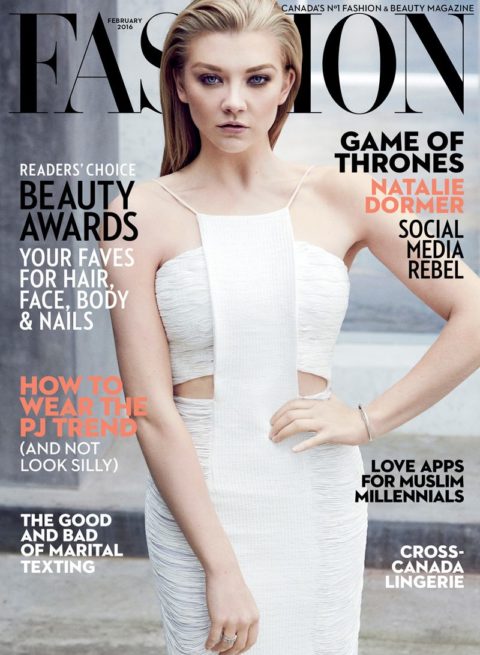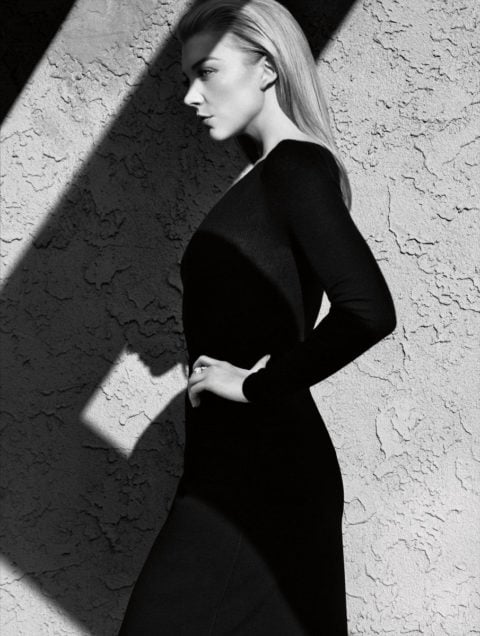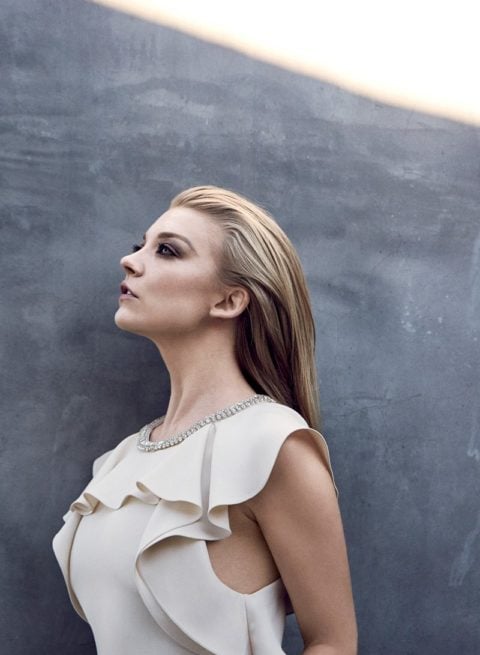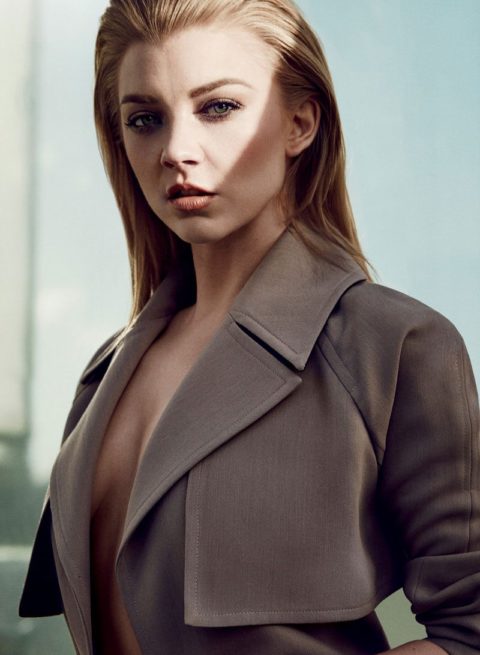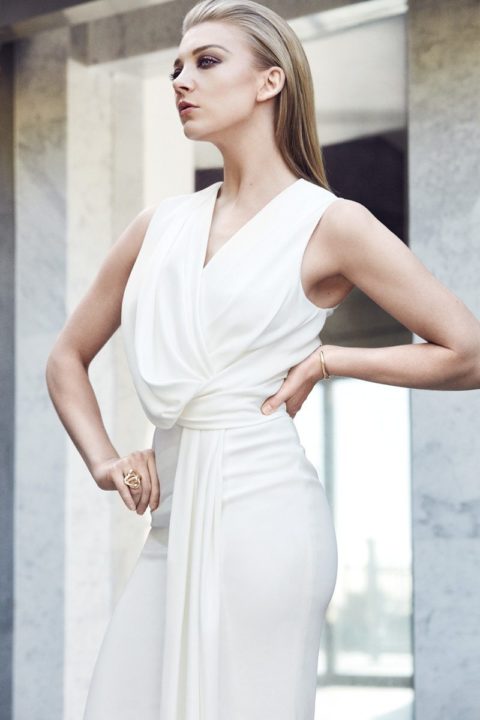FASHION Magazine February 2016 Cover: Natalie Dormer
The lilt in her voice, The confidence in her posture, the way she leans in to stroke her makeup artist’s cheek with a “Good morning, darling”—Natalie Dormer is holding court in L.A.’s Mount Olympus. While it might seem like she’s on the set of a period flick—perhaps playing Helen of Troy—the 33-year-old English actress is simply greeting the FASHION crew for her cover shoot. It is in this pocket of Laurel Canyon—nicknamed after Zeus’ HQ because the surrounding estates are as big as temples and the streets are all named after Greek gods (we are on Electra Drive)—where Dormer is behaving queenly. Minutes after arriving, she gets down to business, charming the crew with her husky laughter and exchanging ideas with the photographer and stylist.
“Why bother being a part of any shoot if you aren’t going to insert yourself entirely into the equation?” she says after the photographer calls the last frame. “One thing I’ve learned in this industry is you have to speak up or you’ll be shut out.” She relishes the shoot—even through crazy temperature shifts. Within a four-hour window, she poses through a thunderstorm, countless gusts of chilly winds and then, in true California-style, blasts of hot sun. Wearing six-inch heels, Dormer urges the crew to keep snapping. She doesn’t simply present herself; she presides.
This aura of power could be derived from the characters she’s taken on. Her most impactful moments on film have been portraying monarchs that drive action. Playing Anne Boleyn for three years in The Tudors would be enough for anyone to feel regal in real life ( “I would rather see her hanged than acknowledge her as my mistress!” Dormer says in an infamous Tudors scene about Boleyn’s rival, Queen Catherine). But Dormer took it up a notch when she signed on to HBO’s Game of Thrones as the determined Margaery Tyrell. She wrestles with Margaery every time she has to enter her world. “Her strength is that she is so beautifully and cleverly ambitious, but, ultimately, because she can’t walk away from the game or her ambition, it becomes her biggest undoing,” says Dormer. She has made Margaery so popular that there are memes and .gifs of her most notorious scene. This would be when Margaery is asked a simple question: “Do you want to be a Queen?” and she fiercerly replies: “No. I want to be the Queen.”
Expect more of the same intense scenes. The highly anticipated sixth season of Game of Thrones is set to air this spring, but before that Dormer is starring in a feature film called The Forest, in which she plays two characters. “They are identical twin sisters [Sara and Jess], and there is an event early in their life that sets them on polar opposite journeys,” she explains. “Both react differently to the childhood situation. Sara is the more straight-laced sister and discovers her sister, Jess, has gone into the Aokigahara forest in Japan near Mount Fuji. This is a real place where people still go to take their own lives. I’m interested in psychologically sophisticated scripts,” Dormer says, noting that it was easy to connect the experience to her work life. “I think the forest becomes a mirror that is held up to you and you have to face your demons. Facing your fears, analyzing your emotions, surviving storms—it can all sound like a metaphor for acting.”
Yet Dormer isn’t satisfied with merely surviving. In fact, she has been quite open—much like her friend Jennifer Lawrence (whom she shared scenes with in the final two Hunger Games movies)—about her opinions on equality. “Women are approximately 50 per cent of the population. We need art in this medium of cinema and TV that reflects that—full stop,” she says. “There’s been a bias [toward] three-dimensional male roles, and there’s an evolution happening. This is overdue.” Dormer notes that the conversation need not be treated like some trend-driven hot topic. “When we aren’t talking about gender anymore, we’ve achieved equality,” she says. “But we still have to talk about inequality until that happens. That’s the dream in any area of society for me: that there is a balance in representation.”
Transforming industries that are built on tradition requires changing from the ground up—specifically in Hollywood, where there have been droughts when it comes to strong female characters. This may be part of the reason why Dormer and her fiancé, director Anthony Byrne, have written a script together and are filming a movie in London called In Darkness. This won’t be the first time Byrne directed Dormer, but as the process of working together unfolds, she is noticing their differences. “I realized how much he comes from the visual side of things. I come from an instinctual side, so I look for a character to have an arc and a feeling about his or her circumstances,” she says. As for the pressure of a couple working and living together, she says, “Honey, talk to me after we’ve finished making the film. No, but seriously, we’ve gone through it all and have been together since 2007. The first time he directed me was the Hozier video [for the song “Someone New”]. If we can survive making a music video where I kiss—is it three or four other men? I’ve lost track—we can survive anything…It’s cliché, but I fell more in love after co-writing with him because I got to see a side of his personality that I hadn’t seen before.”
On set she likes to create community in the costume departments, of which she’s grateful to have been a part. “Seamstresses are the shit!” she says. “I try to keep as close to them as I can in movies. They are incredible beacons in a film. Some of my dresses in The Tudors or the pieces in The Scandalous Lady W were made from scratch and tailored to fit my body. They were some of the most intricate, well-made and well-designed [garments] I’ve ever worn. It was an education to wear those clothes. I send chocolates, champagne and flowers to the seamstresses because they spend hundreds of hours on these pieces—these designs are like their babies.” She recalls how in Game of Thrones she insisted on starting scenes facing away from the camera to show off the intricate backs of her costumes. “Clothes are a vocabulary that we can communicate with. It is so unbelievably important; tight or flowy garments inform a character’s physicality.”
Yet image is something that isn’t top of mind for Dormer in real life. When responding to Amy Schumer’s famous Saturday Night Live appearance—and specifically Schumer’s monologue, which was aimed at the Kardashians and asked the question, “Is that a great message for little girls? A whole family of women who take the faces they were born with as a light suggestion?”—Dormer is democratic but on point. “If you’re not happy with the internal you, you’ll never be happy with the external you. We live in a visually obsessed era. Out of all our senses, sight informs us the most. Visual judgment is a part of life, but we have to struggle daily with the fact that it’s what’s inside that should be prioritized,” she says, noting that she has no Facebook, Instagram or Twitter feed to her name. “The greatest artists, fashion photographers, designers, makeup artists, as well as all the geniuses of the world understand this.”
In terms of her own public appearances, she doesn’t get lost in vanity. “I don’t take the red carpet seriously. Actors are not models. We have to be real people and look quirky and imperfect,” she says. “Telling stories is a celebration of human nature, which means you’re not perfect inside or outside. That’s the beauty of Katniss Everdeen [of The Hunger Games]. She’s a reluctant woman struggling with a sense of identity. These are the characters that need to be presented so young women can stop beating themselves up.”
The post FASHION Magazine February 2016 Cover: Natalie Dormer appeared first on FASHION Magazine.
